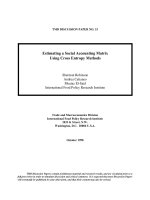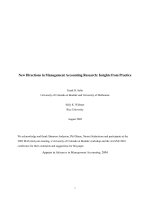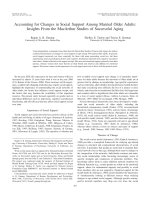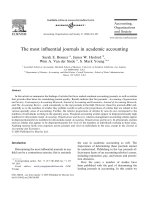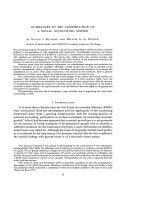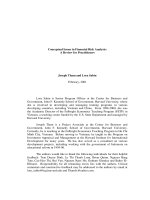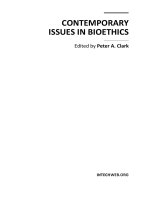Contemporary issues in social accounting
Bạn đang xem bản rút gọn của tài liệu. Xem và tải ngay bản đầy đủ của tài liệu tại đây (14.51 MB, 276 trang )
Contemporary
Issues in Social
Accounting
Edited by
Audrey Paterson, Akira Yonekura
William Jackson and Darren Jubb
Contemporary Issues in
Social Accounting
Audrey Paterson, Akira Yonekura,
William Jackson and Darren Jubb
(G)
Goodfellow Publishers Ltd
(G)
Published by Goodfellow Publishers Limited,
26 Home Close, Wolvercote, Oxford OX2 8PS
British Library Cataloguing in Publication Data: a catalogue record for this
title is available from the British Library.
Library of Congress Catalog Card Number: on file.
ISBN: 978-1-911396-56-7
Copyright © Audrey Paterson, Akira Yonekura, William Jackson and Darren
Jubb, 2018
All rights reserved. The text of this publication, or any part thereof, may not
be reproduced or transmitted in any form or by any means, electronic or
mechanical, including photocopying, recording, storage in an information
retrieval system, or otherwise, without prior permission of the publisher or
under licence from the Copyright Licensing Agency Limited. Further details
of such licences (for reprographic reproduction) may be obtained from the
Copyright Licensing Agency Limited, of Saffron House, 6–10 Kirby Street,
London EC1N 8TS.
All trademarks used herein are the property of their repective owners, The
use of trademarks or brand names in this text does not imply any affiliation
with or endorsement of this book by such owners.
Design and typesetting by P.K. McBride, www.macbride.org.uk
Cover design by Cylinder
Contents
v
1
Contemporary Issues in Social Accounting
1
2
Accountability, Ethics, and the Business World
11
3
History and Dynamics of Corporate Social Responsibility
32
4
Corporate Social Responsibility
54
5
Social Accounting and Sustainability
74
Socially Responsible Investment
92
Foreword
6
Audrey Paterson, Akira Yonekura, William Jackson and Darren Jubb
Audrey Paterson, Yasser Barghathi, Sunita Mathur and William Jackson
Bridget Ogharanduku, Zayyad Abdul-Baki, Abdelrhman Yusuf and Sunita Mathur
Abdelrhman Yusuf, Zayyad Abdul-Baki, Bridget Ogharanduku and Yasser Barghathi
Konstantinos Ritos, Akira Yonekura, Stephen Rae, Oluwagbenga Adamolekun and
Mohamed Elshinawy.
Mohamed Elshinawy, Oluwagbenga Adamolekun, Audrey Paterson,
Mohamed Sherif and Stephen Rae
Auditing for Social Aspects
112
8
Social Accounting and the Public Sector
131
9
Social Accounting and Third Sector Organisations
149
10
Cooperatives and Family Businesses
171
11
Taxation and Social Accounting
188
12
Tomorrow’s Accounting and Society’s Future
204
7
Darren Jubb, Konstantinos Ritos, Yasser Eliwa, and Chris Ryan
Vasileios Milios, Anees Farrukh, Stelios Kotsias, and Mercy Denedo
Stelios Kotsias, Mercy Denedo, Anees Farrukh, and Vasileios Milios
Audrey Paterson, Sebastian Paterson, Eleni Chatzivgeri and Melanie Wilson
Melanie Wilson, Kate Clements, Darren Jubb and Amber Jackson.
Audrey Paterson, Eleni Chatzivgeri, Yasser Eliwa, and William Jackson
Case Studies
Education for a sustainable future: The case of Pakistan
Anees Farrukh
218
Nigerian Oil Spill Monitor: Accountability hybridisation for sustainable development224
Mercy Denedo
Hospital reforms in a period of economic and political uncertainty
Vasileios Milios
230
Management control in Indonesia’s local government
Alexander Anggono
237
Fair tax in a modern society
Melanie Wilson
245
Corporate governance and social accountability in cooperatives
Sebastian Paterson and Audrey Paterson
252
Index259
v
Foreword
The role of the management accountant is one of enabling, shaping and telling the organisation’s value story. It is the story of how organisations create
and preserve value. However, in the storytelling the questions of whose story
and whose value are becoming increasingly important. There is an increasing
demand for a diversity of narratives, depending on the stakeholder, societal
impact, time orientation and governing principles. This book is timely as trust
in global business and its leadership has been in decline, and organisations
are struggling to report on new business models that have shifted value from
tangible to intangible assets.
Through CIMA’s sponsorship of the annual Accounting for Society and the
Environment (ASE) research network workshop at Heriot-Watt University in
Edinburgh, I have had the privilege to witness its great work. The interdisciplinary aspects of the network leads to a cross-fertilization of ideas and innovative
thinking. Through consistent engagement and alignment of shared interests
and language, the network brings credibility to issues in social accounting. The
raised profile of these issues can then foster organisational debate and contribute
to better business practices. From a personal standpoint, I particularly appreciated the friendly and almost family feel to the workshops, making it a safe space
in which to foster thinking and debate. Given the diverse nature of the topics
and issues covered, I have learned much from the different sessions, and have
applied that knowledge to my own areas of management accounting research.
In 2019, CIMA and its professional community of Management Accountants
will reach its centenary year. For almost 100 years, we have been promoting
and developing the science of management accountancy. This has included the
development of CIMA’s code of ethics and the Global Management Accounting
Principles; the purpose of which is to support CEOs, CFOs and boards of directors in benchmarking and improving their management accounting systems. It
helps them to meet the needs of their organisations, effectively and efficiently,
to achieve long-term economic performance, while generating positive value
for society and minimising environmental impact.
At the heart of every Chartered Global Management Accountant (CGMA)
designation holder is the code of ethics. These ethical obligations are built on:
integrity and objectivity; professional competence and due care; confidentiality; and professional behaviour and conduct. They are a commitment to act in
the public interest and maintain public confidence in management accounting
through the highest professional standards. From 1919 to the present, through
examples such as the Global Management Accounting Principles and the code
of ethics, CIMA has continually sought to foster and maintain investigation and
research into the best means and methods of developing and applying the sci-
vi
Contemporary Issues in Social Accounting
ence of management accountancy. I believe this book continues in this tradition.
We are in a period of change that the World Economic Forum has termed, ‘the
Fourth Industrial Revolution’. Technology and its possibilities are impacting on
the evolution of organisations and finance. This is changing the way organisations construct and tell their value stories. It is also allowing organisations to
engage with an ever-greater diversity of stakeholders, and explore the broader
narrative that links business into the rest of society. Finance is struggling to
respond to the emergent new conditions. However, social and environmental
accounting can make a crucial new contribution to the wider understanding of
business and society and the future role of finance in this new epoch. The issues
in this book can help us reconsider, how, as finance professionals, we enable,
shape and tell the value stories of our organisations and societies.
Dr Martin Farrar
Associate Technical Director, Research and Development – Management
Accounting
CIMA
E:
November 2017.
vii
Acknowledgements
Acknowledgements are always a tricky business. They can be sparing or effusive, but if they try to mention individuals then invariably they miss someone
important. To avoid that we will just say that many people have been involved
in the design, authoring, review and editing of this text and we would like to
thank them all. They have done stalwart work in the face of our decision to
adopt extremely tight deadlines and everyone came through when they really
needed to. We are sure there must have been some personal cost at times.
Certainly, there have been stresses and strains, but no one complained, and
everyone delivered. We would also like to thank our colleagues Tim and Sally
at Goodfellow Publishing who have always been supportive of our ideas and
have been understanding when deadlines were pressing. Of course, everyone
involved has family and friends who have shared the sacrifice and we would
like to thank them for their forbearance.
Finally, we would like to acknowledge the
importance of the Accounting for Society and the
Environment (ASE) network. Through its regular
workshops, which for the last few years have been
most valuably supported by CIMA, we have been able to develop the community of interested individuals that have allowed us to create this text. It is
ultimately a community effort and without the ongoing research we would not
be here today and the outlook for the future would be much less promising.
Audrey, Akira, William and Darren
Biographies
Zayyad Abdul-Baki is a PhD candidate at Heriot-Watt University. Prior to
this, he worked as a lecturer at the University of Ilorin, Nigeria. Zayyad is an
associate member of the Institute of Chartered Accountants of Nigeria (ICAN)
and Chartered Institute of Public Finance and Accountancy, UK. Zayyad currently tutors on financial reporting and auditing at Heriot-Watt University
and his research interests are financial reporting, accounting regulation and
accountability.
Gbenga Adamolekun is a doctoral candidate at Heriot-Watt University. He is
a member of the Chartered Institute of Security and Investment (CISI) as well
as the Centre for Finance and Investment (CFI). He holds an MSc in Investment
and Finance with distinction from Bournemouth University. Prior to research,
Gbenga had an extensive experience working in the Finance industry in Nigeria.
His research interest includes corporate finance, market microstructure, asset
pricing, behavioural finance and development finance.
Alexander Anggono is a Senior Lecturer at Trunojoyo University, Indonesia.
Prior to this, Alex had worked for 10 years in a public accounting firm. Alex currently lectures on both management accounting and public sector accounting
courses. His primary research area is on behavioural accounting, with a specific
emphasis on the public sector.
Yasser Barghathi is an Assistant Professor in Accounting at the Dubai Campus
of Heriot-Watt University. During the previous academic year, he has taught
auditing and assurance, international accounting and research methods. His
research interest revolves around financial reporting quality and audit quality.
He is also a professional accountant with over 15 years of experience in the areas
of corporate accounting, financial reporting, and auditing. He is also a member
of the Libyan Accountants and Auditors Association and CPA Australia.
Eleni Chatzivgeri is a Senior Lecturer in Accounting at Westminster Business
School, London. She holds a BSc in Economics, an MSc in International
Accounting and Finance and a PhD in Accounting and Finance. Prior to this she
worked as a teaching assistant at Heriot-Watt University. Eleni’s research interests include: issues arising from the adoption and application of International
Financial Reporting Standards (IFRS), corporate finance, developing theories
of compliance, exploring the success of NGOs lobbying for accounting change.
Kate Clements is Assistant Professor of Accountancy at Heriot Watt University.
She qualified as a Chartered Accountant (ICAEW) with KPMG and has wide
experience working in industry and in public practice. Kate specialises in teaching audit, financial accounting and tax.
Biographies
ix
Mercy Denedo is a PhD student in the School of Social Sciences at Heriot-Watt
University where she is a teaching assistant on a number of accounting courses.
Prior to this, she was a lecturer at Delta State University, Nigeria. Her research
interest focuses on interdisciplinary studies on accountability and governance
in the context of human rights, corporate social responsibility, counter accountability, stakeholders’ engagement and sustainable development.
Yasser Eliwa is Lecturer of Accounting at Loughborough University. Prior to
this, he worked as Senior Lecturer of Accounting at Brighton University for two
years. Yasser currently lectures on financial accounting and reporting, and his
primary area of research is financial reporting and analysis.
Mohamed (Mo) Elshinawy is a doctoral candidate at Heriot-Watt University.
Mo holds a BSc in Business Administration and an MSc in Finance. Prior to
this, he worked as an assistant lecturer at Cairo University, Egypt. He currently
tutors on Governance and Accounting Ethics at Strathclyde University and
Introduction to Accounting at Heriot-Watt University. His research interests
include Behavioural Finance, Corporate Governance, and the governance of
financial institutions.
Anees Farrukh is a PhD student in the School of Social Sciences at the HeriotWatt University. The focus of his research is the educational crisis in Pakistan,
with aims to shed light on the accountability and governance of educational
NGOs in addressing this crisis. His future research plans fare to develop further
into the field of accounting and education by conducting research on accountability, sustainability, educational policy and practice, social and environmental
accounting and public-sector accounting.
William (Bill) Jackson is Head of Accounting at Heriot-Watt University and
holds a PhD from the University of Edinburgh. Bill’s research interests are
primarily in the history of accounting, particularly where accounting interfaces
with medical practice. Other interests are in the more contemporary interface
between accounting and medical practice, the history of accounting and popular culture, management accounting practices in non-Anglo-Saxon contexts and
the gendering of the accountancy profession.
Amber Jasmine Jackson is a freelance proof-reader and copy-editor. Amber
holds a BA (Hons) in Classics from the University of Cambridge and a MSc in Late
Antique, Islamic and Byzantine Studies from the University of Edinburgh. She
is employed by EY as a Tax Advisor in the People Advisory Services practice,
and specialises in Global Mobility consulting. She works with a variety of
middle-market private sector clients, providing tax compliance and advisory
services in conjunction with overseas EY teams. She is based in Edinburgh.
Darren Jubb is an Assistant Professor of Accountancy at Heriot-Watt University.
Prior to this, Darren worked in professional accountancy practice for several
years during which time he qualified as a Chartered Accountant with the
x
Contemporary Issues in Social Accounting
Institute of Chartered Accountants Scotland (ICAS). Darren currently lectures
on financial accounting and audit courses, and his primary area of research is
investigating the links between accounting, management and popular culture.
Stylianos Kotsias joined The American College of Greece in 2009, and since
then he has been teaching accounting and finance courses. Since 2014, Stylianos
is a visiting lecturer at ALBA Graduate Business School, teaching financial and
management accounting courses. Stylianos holds a PhD Degree in Accounting
from Heriot-Watt University in Edinburgh. His research interests lay upon the
areas of accounting and financial accountability reforms in the Greek public
sector.
Sunita Mathur is Assistant Professor in Accounting and Finance at the Dubai
Campus of Heriot-Watt University. She has more than 15 years of international
teaching experience in Higher Education and currently teaches Financial
Reporting, Managing Corporate Value and Contemporary issues in Financial
Accounting. Her research interest principally lies in Accounting Regulatory
Frameworks, Corporate Social Responsibility and SMEs. She also supervises
MSc dissertations on various subjects.
Vasileios Milios is a PhD candidate at Heriot-Watt University. He has completed
his studies in Accounting (BSc, ATEI of Larisa) and in International Accounting
and Finance (MSc, Heriot-Watt University). Vasileios’ research interest mainly
focuses on public sector accounting and accounting history and, more specifically, on the interplay between accounting and the political environment.
Bridget Efeoghene Ogharanduku is a PhD candidate in Accountancy at the
Heriot-Watt University. Her main research interests focus on gender in the
accounting profession and accounting history. She has taught on the social and
environmental accounting course at the undergraduate level at Heriot-Watt
University. Prior to this, Bridget has also held academic roles as a Graduate
Assistant, Teaching Assistant and Assistant Lecturer at Delta State University,
Nigeria. Her main teaching areas are in both financial and management
accounting.
Audrey S Paterson is an Associate Professor in Accounting at Heriot-Watt
University and holds a Bcom (Hons), MSc in Social Science Research and a
PhD from the University of Edinburgh. Audrey is currently involved in several
research networks including the Institute of Public Sector Accounting Research
(IPSAR) and is the founder of the Accounting for Society and the Environment
(ASE) research network which meets annually. Audrey is also responsible for
the management of the PhD programme within the Department of Accounting,
Economics & Finance.
Sebastian F Paterson is the Chief Executive Officer of Seallaidh na Beinne
Moire, a community owned estate company formed in 2006 under the Scottish
Land Reform Act 2003. In his present role, Sebastian manages South Uist
Biographies
xi
Estate’s crofting, shooting and fishing assets, the South Uist Renewable Energy
Windfarm and the recently constructed Lochboisdale Harbour; additionally, he
is developing economic and social projects aimed at enhancing employment and
retaining population on the estate. Sebastian received a Master’s Degree with
Distinction from Heriot-Watt University in 2015.
Stephen Rae is a postdoctoral researcher, and was awarded a PhD from HeriotWatt University in 2016. His primary research interests lie in how and why
companies release information. He received an MA in Accounting and Finance
in 2010 and an MRes in the same in 2011, both also from Heriot Watt. He has a
further research interest in quantitative methodologies and their uses following
an earlier degree in Statistics, awarded in 2007.
Konstantinos Ritos is part of the Accounting Postgraduate Research team at
Heriot-Watt University and parallel to researching, acts as a Student Representative
for Accounting Postgraduate Researchers there. His previous studies include an
MSc in International Accounting and Finance at Heriot-Watt University in 2016,
where he graduated with a distinction, and a degree in Accounting and Finance
from A.T.E.I. of Thessaloniki. Konstantinos has also previously worked in the
accounting office of the Water and Sewer Supply of Thessaloniki public company
for six months.
Chris Ryan is currently a Consultant with Deloitte in Finance Transformation,
Chartered Accountant with ICAS and received a First-Class Honours degree
from Heriot-Watt. Chris has worked with a wide variety of clients in both public
and private sectors. His role primarily focuses on solving the key issues facing
Finance Functions in organisations. The range of issues is broad and includes
the social and ethical implications of the actions of the Finance Function and the
resulting impact on the organisation’s reputation, CSR and bottom line.
Mo Sherif is Associate Professor of Finance. He received his PhD from the
University of Manchester, UK. He is an interdisciplinary Finance researcher
whose initial contributions to the Finance literature are in Entrepreneurial
and Behavioural Finance, Stock Trading Strategies and Asset Pricing fields.
He is a fellow of the Higher Education Academy in the UK and a member of
the American Finance Association in the USA. He is currently the Director of
Postgraduate Taught Programmes in Finance (AEF) at SoSS and Senator at
Heriot-Watt University.
Melanie Wilson is a Chartered Accountant, Chartered Tax Adviser and ethical
entrepreneur with experience across the private, public and third sectors. Melanie
is currently the MD of businesses with local to global client bases operating
within professional practice and training. Melanie also currently lectures in tax
and accounting subjects at Heriot Watt University. Melanie is currently engaged
with both ICAEW and CIOT committees representing members and society
regarding tax and education issues. Melanie’s research interests are based in tax,
xii
Contemporary Issues in Social Accounting
including avoidance, contemporary and society issues.
Akira Yonekura is currently an Assistant Professor at Heriot-Watt University,
Director of Undergraduate Teaching Programmes for Accounting, Economics
& Finance and a member of the Accounting for Society and the Environment
(ASE) research network. Akira’s research and teaching interests involve a critical
analysis of current and historical accounting and corporate governance practices
in their socio-economic, political and cultural contexts.
Abdelrhman Yusuf is currently a doctoral researcher at Heriot-Watt University.
He received his second MSc award from the University of Dundee. Yusuf has
ten years of teaching experience with undergraduate and post-graduate students
during which time he become an Associate Fellow of the Higher Education
Academy (HEA). His research interests are corporate governance, social responsibility, strategic management, and shareholders’ activism.
1
Contemporary Issues
in Social Accounting
Audrey Paterson, Akira Yonekura, William Jackson
and Darren Jubb
Introduction
The discipline of accounting has ancient roots. Indeed, there is evidence in historical artefacts indicating that records of account, in the form of clay tablets,
regarding business, finance and taxation, date back to around 2500-3300 BC in
Egypt and Mesopotamia. These early records were lists of expenditures, goods
received and traded, and were kept by rulers for the purposes of gathering
taxation and tracking expenditures on public works. They were further used to
validate the use of taxes raised for the common good and to demonstrate the
social responsibility of the rulers. Such records therefore suggest that for as long
as societies have engaged in trade, records have been kept and used as a form of
social accountability.
From these early roots, accounting as both a function and a profession
has gone through a long evolutionary process. One of the first professional
accounting organisations, the Edinburgh Society of Accountants, was founded
in Scotland in 1854, with the Glasgow Institute of Accountants and Actuaries
appearing soon after in the same year. These organisations established a distinct
profession with a high level of reliability, responsibility and honesty. On these
grounds, they sought out, and were granted, a royal charter. Following this, the
Edinburgh institute adopted the title ‘Chartered Accountant’. As economies
grew and businesses expanded, the demand for accounting services increased,
resulting in accounting and accountants becoming an integral part of business
entities. This also led to the geographical expansion of professional accounting
bodies, for example, the Institute of Chartered Accountants for England and
Wales, which was formed in 1880. The establishment of professional accounting
institutes however, was not isolated to the UK. In 1887, the American Institute of
2
Contemporary Issues in Social Accounting
Certified Public Accountants was created, along with several others appearing in
Europe. More recently, in 1949, the Chartered Institute of Accountants of India
was formed and more recently still, the Institute of Chartered Accountants of
Nigeria was established in 1965. Indeed, there are now professional accounting
organisations all over the world.
Accounting as we know it today can be described as concerning the bookkeeping methods that are used to create financial records of business transactions
which, in turn, lead to the preparation of statements concerning the assets, liabilities, and operating results of an entity. The accounting system is an arrangement
consisting of a group of interacting, interrelated, or interdependent elements
forming a complex whole which involves people, procedures, and resources used
to gather, record, classify, summarise and report the financial (and increasingly
non-financial) information of a business, government or other financial entity.
While accounting can still, in some sense, be categorised as a technical topic, it
has retained a social accountability orientation that contains similarities to its earliest origins, thus rendering it not only an institutional, but also a social, practice
(Hopwood and Miller, 1994). Indeed, several strands of research demonstrate the
role of accounting in management motivations for: social reporting/disclosure;
as a tool for securing and maintaining legitimacy and societal expectations;
demonstrating ethical and social accountability to stakeholders and the wider
community and as a social accountability tool. Thus, social accounting can be
defined as:
“the preparation and publication of an account about an organisation’s social,
environmental, employee community, customer and other stakeholder interactions and activities, and where possible, the consequence of those interactions and
activities” (Gray, 2000: 250).
For a considerable period, much of the academic writing and teaching on
accounting has tended to ignore or pay scant attention to the concept of social
accounting, despite it having wide ranging implications for both the profession
and society. Over the last few decades we have seen an increasing amount of
attention being given to the activities of business and the role that accounting
plays in organisational decision-making. Much of this attention has been driven
by the economic and financial crisis which have occurred in recent years and a
succession of financial scandals, reports of unethical or questionable business and
accounting practices, and by calls from the media and society to address these
issues. In response to these calls there has been a strengthening of financial and
business ethics, corporate responsibility and social accounting courses within the
accounting teaching curriculum.
Accounting, as a profession, has maintained its prestigious status and attracts
large numbers of students on undergraduate accounting programmes every
year. Indeed, most universities offer accounting degrees as part of their portfolio
of programmes. However, most of these degree programmes focus much of
Contemporary Issues in Social Accounting
3
their teaching on private sector organisations, neglecting other key areas of the
economy such as the public and third sectors, cooperatives and family businesses.
The aim of this book is to fill this gap by introducing you to the applicability of
social accounting and social responsibility to each of these sectors. The importance of social accounting with respect to sustainability, socially responsible
investments, the role of social audits and taxation issues relating to these sectors
is also generally neglected in the curriculum, thus a further aim of this book is
to introduce you to these concepts and some general debates in these areas. To
achieve these aims, we begin our discussion by considering both a historical and
contemporary viewpoint of the relevance of accountability, ethics and corporate
social responsibility to these sectors, highlighting along the way some serious
issues and considerations that need to be accounted for within these sectors.
Accountability, ethics and the business world
The concepts of accountability, ethics and their relevance within the business
world have grown considerably in recent years, within both the educational
and professional context. This can be attributed to the work of philosophers
and scholars within accounting and finance who have successfully connected
ethical theory to real world problems (Paterson et al., 2016). One of the main
driving forces behind business is the desire to generate profit. Indeed, in Western
capitalist societies the activities of business and the financial services industry,
and their decision-making processes, are predominantly motivated by profit
maximisation goals which can often lead to highly questionable decisions being
made (Paterson et al., 2016). We do not need to look too far into the business
world to find examples that raise questions over the moral and ethical behaviour
of organisations, regardless of the sector in which they are placed. Such scandals
have resulted in growing demand for accountability across all sectors. Indeed,
calls for these organisations to be held accountable for their actions, and for
policies to be adopted to help prevent unethical expressions, which affect a wide
range of stakeholders, feature highly in the media.
In Chapter 2, we introduce you to two interrelated concepts: social accountability and ethics, and discuss their importance to everyday life. We begin by
first considering what accountability and business ethics are and why they are
important. Following this we introduce a discussion on the codes of conduct that
facilitate social ethics and accountability. To illustrate these concepts, the chapter
includes examples of issues that require careful reflection and consideration
when determining approaches to business activity and ensuring professional
integrity. This is followed by a discussion on the limitations of ethics and codes
of conduct.
1
4
Contemporary Issues in Social Accounting
History and dynamics of corporate social responsibility
Following our discussion of accountability, ethics and the business world we
move on to considering the dynamics of social responsibility practices and
concepts, to demonstrate how they have grown and shaped business practices,
corporate regulations and reporting. We begin this discussion with a historical
overview of the development of corporate social responsibility (CSR) from the
mid-19th century industrial revolution, when commercial activities began to
expand considerably, and the forms of business ownership began to evolve. This
is an important starting point as it facilitates understanding of how organisations
have responded and adapted to meet changing societal expectations; comply
with regulatory bodies and institutionalise CSR within contemporary business
environments and reporting frameworks.
Chapter 3 therefore considers CSR from a historical perspective and the driving forces which initiated changes to CSR practices within organisations. While
CSR appears in many countries of the world, in terms of scholarly debates, it is
more evident in Western economies. Early writings originated from the United
States, however, over the last three decades increased attention has been given
to this topic in Europe. In developing economies, there has been an ongoing
debate about CSR over the last decade, especially in the context of globalisation, corruption and transnational business and reporting. The discussion and
debate in this chapter provides the foundations needed to understand CSR from
a contemporary perspective which will be presented in Chapter 4.
Corporate social responsibility
Whilst CSR has attracted attention from practitioners and academics from different disciplines over the years, the notion of CSR has yet to be constructed
into a cohesive whole. Indeed, when investigating this concept, it is clear that
there is no universal agreement on what CSR is, the rationale behind it, or the
strategies for achieving it. However, the extant literature does provide a solid
foundation in which to explore and integrate these widely divergent viewpoints
on CSR. As previously mentioned, a prevalent objective of organisations is the
desire to maximise the wealth of capital providers (shareholders). Opponents of
this notion have, however, argued that organisational activities impact on other
parties that are directly or indirectly related to the organisation. It is also the case
that organisations can be affected by their stakeholder/shareholder behaviour
through their buying power or voting rights. Thus, it can be argued that all of
these parties should be considered in the decision making of an organisation for
it to be financially viable in the long-run.
To expand on these ideas, Chapter 4 unveils and integrates insights into CSR
issues by considering environmental, social, economic, stakeholder and voluntary dimensions of CSR activities carried out by organisations from the most
basic level (economic responsibility) to the most developed level (philanthropic
Contemporary Issues in Social Accounting
5
responsibility). The divergent theoretical arguments regarding the ethics and
morality of corporate behaviour are also threaded throughout the discussion.
Following this, the strategic approach to CSR implementation which assumes
that corporations should absorb CSR as a key business issue rather than an ad
hoc response to corporate social and economic failures is considered. Stakeholder
engagement, CSR reporting and the frameworks often employed by organisations in communicating their CSR activities are also included.
Social accounting and sustainability
The concept of sustainability assumes that resources are finite, and should be
used and managed conservatively while also considering the long-term priorities
of society, the environment and the consequences of how and to what extent
these resources are used. In simple terms, sustainability is about avoiding harm
to the environment and the depletion of natural resources, thereby supporting a
long-term ecological balance to ensure we leave the planet for future generations
no worse than when we entered it. The concept of sustainability is currently the
subject of much debate, indicating that it is of major importance. Providing the
next generation of accounting students with greater knowledge of sustainability
will have positive effects on the future of both professional practice and the
movement towards a more sustainable world. As de Aguiar and Paterson (2017)
show, it is an area that is positively received by both students and academics in
higher education. Additionally, the subject creates valuable knowledge and skills
for both groups.
To address this, Chapter 5 takes a closer look at sustainability developments.
It begins with a discussion of the triple bottom line (TBL), a key concept influencing the development and practice of social and sustainability reporting. The
emphasis is on both the positive aspects of the TBL as well as its limitations. This
is followed by a discussion of major initiatives within the context of CSR and
sustainability, including attempts by not-for-profit organisations as well as local
governments and the EU. The chapter then takes a closer look at some of the key
organisations involved in initiatives on CSR and sustainability reporting, before
briefly discussing key reporting guidelines. Having outlined key initiatives and
the organisations behind them, the chapter then moves on to a discussion of two
key concepts in social and sustainability accounting: sustainability and accountability. We do this by first defining sustainability and providing examples of
sustainability reports, including public sector accounting reports. The concept of
accountability and socially and environmentally responsible actions, as well as
the need for transparency and disclosure are then discussed.
Socially responsible investment
Having considered various issues and aspects of social accounting and their application including corporate social responsibility (CSR), we now turn our attention
to another important aspect of business: how to attract and maintain financial
1
6
Contemporary Issues in Social Accounting
investment to support and grow the organisation. Businesses require investment;
without it, there is no financing for operations that foster growth. Many investors
have their own set of priorities when committing cash to an organisation and this
can encompass their social responsibility concerns. Such concerns have led to a
practice known as socially responsible investment (SRI). This can loosely be defined
as shareholders making investments with a desire for socially beneficial results,
in addition to the more traditional desire for financial returns.
The concept of SRI has grown considerably in recent years, particularly in
response to the media raising awareness of the ruthlessness of corporate activity
and social inequality across the globe. Chapter 6, therefore, introduces the SRI
concept. It begins with a brief outline of its evolution and continuing importance
to the present day. The legitimacy of SRI in the 21st century and the influence
of the United Nations Sustainable Development goals and principles on SRI are
then discussed. This then leads into a discussion on SRI decision-making in the
form of environmental social governance (ESG) a vital tool available to investors
in selecting investments based on a combination of financial returns, social
responsibility, and personal ethics. The importance of non-financial outcomes
to investors is also discussed. This is followed by a discussion of some investment options that are available to investors before moving on to consider the
performance of SRI investments.
Auditing for social aspects
As an early advocate of social responsibility, Goyder (1961), believed that
stakeholders in local communities and wider society should demand greater
accountability from organisations regarding their social, environmental and ethical impact. Social audit was put forward as a means of delivering such accountability to stakeholders. According to Goyder, if organisations are not willing to
take control over their own social and environmental accountability, then society
at large must take matters into its own hands. Social audit, therefore, began as an
exercise at the level of civil society, carried out by parties external to the organisation being ‘audited’. Since then, auditing for social aspects has developed to
become a core element of the practice of accounting.
Chapter 7 provides an overview of the main developments within the social
audit movement. The chapter discusses three types of social audit: external social
audits, supply chain audits and the self-generated social audit. More specifically,
it highlights the nature and scope of social audit, how the data used in social
audits are collected and reported, and who is responsible for providing assurance in relation to social audits.
Having considered the foundations of social accounting and the concepts of
CSR, sustainability, SRI and social audits, the book from here turns its attention
to the applicability of these concepts to organisations in the public and third sectors as well as to cooperatives and family businesses.
Contemporary Issues in Social Accounting
7
Social accounting and the public sector
In modern societies, the public sector is the heart of democracy as it illustrates the
sovereignty of citizens who transfer their power to sovereign governments (Jones
and Pendlebury, 2010). The social nature of the public sector is undeniable as it
is fundamentally different from the private sector. The main aim of the public
sector is not profit maximisation but the creation of social value. The means that
the definition of assets differs in public sector accounting as they are not expected
to bring economic benefits, but are used instead to provide services and goods to
citizens. However, social value cannot be clearly defined as, within public sector
organisations, there is a complex framework of interests which derive from different perspectives. In this context, the role of accounting is very important as it
must ensure democratic control over the use of funds (Pallot, 1992).
The global financial crisis of 2008 brought to the surface new and strident calls
for the restructuring of the public sector. The call of Hopwood and Tompkins
(1984) for researchers to explore the organisational, institutional and social nature
of accounting practice thus became more relevant than ever. Chapter 8 presents
the fundamental characteristics of public sector accounting and an examination
of the environment in which public sector accounting operates. Our discussion
focuses on who is responsible for the public sector crisis, the initiatives that have
been undertaken, the heterogeneous challenges that the public sector faces, and
how these issues could be addressed.
Social accounting and the third sector
In recent years, much attention has been paid to the roles and the responsibilities
of not-for-profit or charitable organisations. These mission-based entities seek
social impact rather than profitability for shareholders and comprise what is
known as the third sector of economic activity (Lindsay et al., 2014). Focus on
these socially-driven entities and their performance has increased over recent
years, primarily due to the alleged failure of third sector organisations (TSOs)
to efficiently deploy financially sustainable services and achieve associated
programmatic goals. Like public sector entities, TSOs are under pressure to be
accountable for delivering value-added services to their constituents. However,
the way TSOs are held accountable is different; they are expected to manage a
‘double bottom line’, in that they must deliver a measurable and meaningful
social impact for their beneficiaries, while also responsibly and transparently
accounting for the financial resources entrusted to them by their donors (The
Scottish Government, 2011).
Chapter 9 discusses the nature and purpose of third sector organisations and
the role that they play within society. This is followed by a discussion of what
accountability means in the third sector and why it is important. The concept of
third sector accountability is considered through three key lenses; an examination of the reporting framework applied by TSOs, scrutiny of ‘The Non-for-Profit
1
8
Contemporary Issues in Social Accounting
Starvation Cycle’ and investigation into TSO governance. The chapter then
discusses the three forms of accountability typically found in TSOs, upward,
downward and holistic.
Cooperatives and family businesses
Having considered social accounting within the private, public and third sectors
and explored related concepts we move on to consider two further important
economic sectors, namely cooperatives and family businesses. In contrast to
public and private companies, the main purpose of a cooperative is the advancement of its members and not the pursuit of public interest. Cooperatives hold a
profit motive for their members. While cooperatives provide a significant contribution to the economy, a large proportion of the UK’s economy is also supported
by family businesses. Family businesses, in contrast to cooperatives, public and
third sector organisations, are driven by profit maximisation in the same way as
large multi-national organisations. Indeed, it is estimated that family businesses
account for almost 25% of the UK’s gross domestic product (GDP). As such, these
two areas are of increasing importance when considering accountability and the
governance responsibilities of organisations. Likewise, given the importance
of the role boards play in the success or failure of cooperative organisations
and family businesses, and the importance of these organisations in the wider
economy, it is prudent to develop some knowledge and understanding of the
complex ways that these boards can be structured and the role that they play
in achieving accountability and governance within the organisation and to the
wider community.
Within Chapter 10 we begin with a short overview of the evolution of
cooperatives and what constitutes a family business, followed by a discussion
of the organisational model and governance structures and their effectiveness.
To achieve this, we consider the following: who governs; board roles and board
relationships with management; board size and director selection processes; and
the importance of board member participation and the input of managers in relation to accountability and governance in these two sectors.
Taxation and social accounting
Taxation relates to transactions between taxpayers and the state, and, like all
transactions, needs to be accounted for and reported in the interests of accountability and transparency to society. Taxes are essential for the functioning of a
modern state, as they are typically the primary source of revenue for funding
public services. Governments are charged with making choices about how to
raise finance through the system of taxation and when and to what extent to
offer incentives and waivers of taxation, which can result in foregoing revenues
in some areas. Governments, therefore, also need to be held to account for the
tax systems they create. Over the past 25 years, the minimal taxation paid by
Contemporary Issues in Social Accounting
9
some large organisations has increasingly been a social and ethical issue and has
become a high-profile concern for society and for governments. Thus, it is very
timely to set tax within the context of Social Accounting in this text book.
Chapter 11 begins by presenting a broad overview of the objectives and
scope of taxation before discussing issues surrounding the calculation of tax.
The chapter then discusses taxation within the context of social responsibility,
with an emphasis placed on entities other than private organisations, including
NGOs, cooperatives and family businesses. Following this, the chapter considers
the future direction of taxation within the context of social accountability and
transparency.
Tomorrow’s accounting and society’s future
The purpose of this book is to introduce you to the notion of accounting for society, the historical development of corporate social responsibility, accountability
and ethics and their importance to everyday life. We note that the practices we
consider central to accounting are as old as human history and are essential to the
functioning of complex societies. However, these foundations have come under
critical scrutiny in recent years, particularly following the recent spate of global
financial crises. Indeed, the reliance, accuracy and compliance of accounting
information and the profession that generates it were heavily criticised alongside
those other organisations that had also not foreseen or reacted to the global financial crisis adequately. In the book we show that such issues are not restricted to
the private sector. Indeed, these issues are equally applicable to the public and
third sectors as well as cooperatives and family businesses.
In the concluding chapter, we draw together the disparate strands of social
accounting covered in this book. We acknowledge that, despite the growing
trend of corporate accountability and the increasing revival of social accounting,
there remains a significant gap between what organisations do, what they are
willing to report, and the rights of society. We further note that globalisation
and political uncertainty pose challenges to organisations in implementing social
accounting practices. The chapter then moves on to consider how public sector,
third sector, cooperatives and family businesses need to adapt and respond to
demands for increased social responsibility, and to demonstrate this through a
social accounting and accountability system. This is followed by a discussion of
the future directions and potential developments within the social accounting
arena.
While this book is targeted at undergraduate accounting students, the material is of interest and relevance to a wider audience. We hope that it will stimulate
interest and thought in anyone wishing to develop knowledge and understanding of why social accounting, corporate social responsibility and the need to
consider sustainability are important concepts and issues, not only for society of
today, but for future generations.
1
10
Contemporary Issues in Social Accounting
To facilitate knowledge and understanding of the key concepts and issues
covered in this book, each chapter is supported with end of chapter discussion
questions. Mini case studies are also provided, at the end of the book, to stimulate discussion and reflection. Additionally, we have provided on the publisher’s
website, instructor’s resources in the form of PowerPoint presentations and a
set of multiple choice questions for each chapter. Solutions to the end of chapter
discussion questions and the mini case studies are also available. Find these all at:
/>
References and further reading
de Aguiar, T. and Paterson, A. (2017). Sustainability on campus: knowledge creation
through social and environmental reporting. Studies in Higher Education, pp.1-13.
Gauthier, Y., Leblanc, M., Farley, L. and Martel, L. (1997) Introductory Guide to
Environmental Accounting. KPMG, Montreal.
Goyder, G. (1961). The Responsible Company. London: Blackwell.
Gray R.H. (2000). Current developments and trends in social and environmental
auditing, reporting and attestation: A review and comment. International Journal of
Auditing, 4(3), 247-268.
Hopwood, A. G. and Miller, P., (eds.) (1994). Accounting as a Social and Institutional
Practice. CUP, Cambridge.
Hopwood, A. and Tompkins, C. (1984) Issues in Public Sector Accounting. Oxford: Philip
Allan Publishers Limited.
Jones, R. and Pendlebury, M. (2010) Public Sector Accounting. Harlow: Pearson
Education Limited.
Lindsay, C., Osborne, S.P. and Bond, S. (2014). New public governance and
employability services in an era of crisis: challenges for Third Sector Organizations
in Scotland. Public Administration, 92(1), 192-207.
Mathews M.R. and Perera M.H.B. (1995). Accounting Theory and Development (3rd Ed).
Melbourne, Thomas Nelson Australia.
Pallot, J. (1992). Elements of a theoretical framework for public sector accounting,
Accounting, Auditing and Accountability Journal, 5(1), 38-59.
Paterson, A.S., Leung, D., Jackson, W., Macintosh, R. and O’Gorman, K. (eds.) (2016).
Research Methods for Accounting and Finance. Goodfellow, Oxford.
Ramanathan, K. V. (1976). Toward a Theory of Social Accounting, The Accounting
Review, 516–28.
The Scottish Government (2011). Renewing Scotland’s Public Services. Priorities for
reform in response to the Christie Commission. Available at: t
2
Accountability, Ethics,
and the Business
World
Audrey Paterson, Yasser Barghathi, Sunita Mathur
and William Jackson
Introduction
The activities of business and the financial services industry, and their decisionmaking processes are predominantly motivated by profit maximisation criteria,
which can often lead to highly questionable decisions being made (Paterson et
al., 2016). Indeed, we do not need to dig too far into the financial services world
and the activities of business to find examples that demonstrate a distinct lack of
consideration for society, the environment or human life, as well as activities that
demonstrate questionable moral or ethical behaviour. The collapse of Enron, for
example, was an outcome of unethical behaviour by the management and the
accounting firm (Arthur Andersen), which resulted in great losses suffered by
all of its stakeholders. Questionable business and accounting decisions are not
restricted to the private sector but are also found within the public and third sectors. Cooperatives and family businesses are also not exempt from questionable
business behaviour.
Within the public sector, the MHB Bank of Vietnam, which is part of the fully
state-run Bank for Investment and Development of Vietnam, was exposed to
fraudulent activities amounting to millions of dollars by three senior bankers
and six securities officials (Channel News Asia, 2016). Petrobras, one of the largest state-owned oil organisations of Latin America also suffered from fraudulent
activity of around $400m involving 35 members of which several were chief
executives (Leahy, 2016; Guardian, 2014). The CEO within Age UK, a charity
providing services and support for older people in the South Tyneside community, was charged with defrauding more than £700,000 from the organisation
12
Contemporary Issues in Social Accounting
(Cooney, 2015). The Co-operative Bank in the UK has been involved in a series
of scandals including alleged drug-taking by former chairman Paul Flowers
(Goodway, 2013). Family businesses, despite being run with a more hands-on and
inclusive management style are also vulnerable to fraud. For example, Parmalat
suffered four decades of fraudulent activity by Calisto Tanzi which ultimately
led to its collapse (Guardian, 2004). Such scandals have led to growing demand
for accountability across all sectors. Indeed, calls for these organisations to be
held accountable for their actions, and for policies to be adopted to help prevent
unethical actions that affect a wide range of stakeholders, feature highly in the
media.
The concepts of ethics and social accountability have grown considerably in
recent years in both the educational and professional contexts. This can be attributed to philosophers and scholars within accounting and finance successfully
connecting ethical theory to real world problems (Paterson et al., 2016). Within this
chapter, we introduce you to two interrelated concepts: social accountability and
ethics and their importance to everyday life. We begin by first considering what
accountability and business ethics are and why they is important. Following this
we introduce a discussion on the codes of conduct that facilitate social ethics and
accountability. The chapter includes examples of important issues that require
careful reflection and consideration when determining approaches to business
activity and ensuring professional integrity. This is followed with a discussion
on the limitations of ethics and codes of conduct.
Accountability concepts and relationships
Accountability, according to Bovens (2010), is a term that could embrace more than
one meaning depending on the context in which it is used. A simple definition of
accountability is taking, or being assigned, responsibility for something that you
have done, or something you are supposed to do. From an ethics perspective,
accountability is answerability, blameworthiness, liability, and the expectation of
account-giving for one’s actions. According to Day and Klein (1987), accountability is expected to be perceived differently in different contexts since it is a social
and political process; they believe that accountability is mainly concerned about
the definition of a certain type of conduct and how it is assessed. Sinclair (1995)
stressed the importance of language in shaping accountability understanding.
For example, an auditor views accountability as a financial matter, whereas a
politician sees accountability as a political issue.
Accountability is arguably something that everyone should respect. It is
a ‘gold’ concept that everyone agrees with and it is widely used in political
discourse since it implies transparency and trustworthiness. However, it is also
an ‘elusive concept’ that can mean different things to different people (Bovens,
2007). Laughlin (1990) justifies the linkage between finance and accountability

